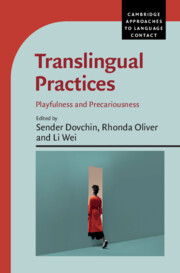Book contents
- Translingual Practices
- Cambridge Approaches to Language Contact
- Translingual Practices
- Copyright page
- Contents
- Figures
- Tables
- Contributors
- Foreword
- Acknowledgements
- 1 Introduction
- Part I Beyond Translingual Playfulness
- Part II Online Activism
- Part III Critical Pedagogy
- Part IV Ways Forward
- 12 Translanguaging as Mass
- 13 Afterword
- Index
- References
12 - Translanguaging as Mass
A Lay-Oriented Approach
from Part IV - Ways Forward
Published online by Cambridge University Press: 07 May 2024
- Translingual Practices
- Cambridge Approaches to Language Contact
- Translingual Practices
- Copyright page
- Contents
- Figures
- Tables
- Contributors
- Foreword
- Acknowledgements
- 1 Introduction
- Part I Beyond Translingual Playfulness
- Part II Online Activism
- Part III Critical Pedagogy
- Part IV Ways Forward
- 12 Translanguaging as Mass
- 13 Afterword
- Index
- References
Summary
In this chapter, the authors underline the need for a lay-oriented approach to translanguaging. They explicitly retain the trans-prefix – not merely to transcend the language systems and structures of the mainstream paradigm, i.e. ‘language’ as count, but to question the very nature of ‘language’ as mass. Adopting a southern perspective, they suggest that ‘language’ (mass) may possess multiple natures i.e. they move from a critique of ‘languages’ as socially constructed fixed-codes, i.e. hermetically sealed entities, to a critique of ‘language’ as having a universal ontology. They argue that linguistics needs to be lay-oriented, whereby ‘lay-orientedness’ is to be construed in two ways: (i) it takes seriously the most diverse cultural and individual views on what constitutes ‘language’ (and ‘a language’), i.e. it moves beyond northern folklinguistic categories and conceptions to include the Global South as a rich field of radically different lay metalinguistic discourses. And (ii), it theorizes language and communication in ways lay people might not express it, while allowing them to recognize their own communicational practices in the theory, irrespective of cultural differences. On that view, ‘languaging’ is not a separate or separable activity – pace translanguaging scholarship – the reason being that it does not possess a determinate ontology.
- Type
- Chapter
- Information
- Translingual PracticesPlayfulness and Precariousness, pp. 221 - 236Publisher: Cambridge University PressPrint publication year: 2024

